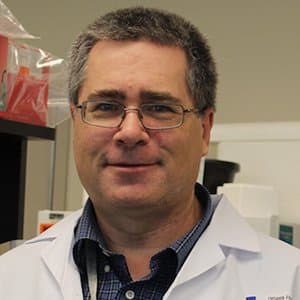Scientific Advisory Board

Professor of Clinical Genetics
University of Oxford-Medical Sciences Division
Leader of Gibbons Group: ATRX Group
The principal aim of the group is to characterize the ATRX protein; germline mutations in the underlying gene give rise to a severe X-linked form of syndromal intellectual disability one feature of which is alpha thalassaemia. We run a clinical and molecular diagnostic service through which we have collected over 200 affected families. We identify the underlying mutations and through microarray gene expression analysis, methylation studies, enzyme assays and protein structure studies we are defining their functional consequences. This clinical work also informs our research which is to both understand the function of this protein and understand how mutations lead to disease. Recent work has shown that ATRX with the histone chaperone DAXX remodels chromatin by replacing canonical histones with the histone variant H3.3 and that this role is important in maintaining epigenetic memory and patterns of gene expression.
In the last 5 years it has been shown that ATRX acts as a tumour suppressor. Somatic mutations in ATRX are observed in a group of cancers which maintain their telomere length not by reactivating telomerase as is seen in 85% of cancers, but using homology directed repair, a process known as Alternative Lengthening of Telomeres (ALT). We have shown that re-expressing ATRX leads to repression of ALT and this has opened up a new area of research which we are exploring in collaboration with Dr David Clynes (Dept of Oncology)
Dr. Richard Gibbons joined ARA in 2021, we are grateful for his expertise and support!

Professor, University of Ottawa Senior Scientist, Regenerative Medicine Program,
Ottawa Health Research Institute
Dr. Picketts completed a PhD at Queen’s University (Kingston) in 1993 with Dr. David Lillicrap studying Hemophilia B and the transcriptional regulation of the Factor IX gene. He then pursued postdoctoral research in Oxford, England with Dr. Douglas Higgs at the Weatherall Institute of Molecular Medicine. Here he began studies with a clinical research fellow, Dr. Richard Gibbons to identify the causative gene of the ATR-X syndrome. In 1995, they identified the ATRX gene establishing the paradigm that dysfunctional chromatin remodeling proteins cause human disease.
In 1997, Dr. Picketts joined the Ottawa Hospital Research Institute as an independent investigator to continue his research on defining the role of epigenetic regulators in brain development and neurodevelopmental disorders (NDDs). The Picketts laboratory has focused on the generation and characterization of transgenic mice that model different NDDs. His laboratory has characterized the first models of the ATR-X syndrome, NEDDFL syndrome (BPTF gene), and the BFLS syndrome (PHF6 gene) that have unraveled novel disease mechanisms for these disorders. In addition, his lab studies the interplay between two closely related chromatin remodelers of the ISWI family, SMARCA1 and SMARCA5, to dissect their complementary roles during forebrain development.
Dr. David Picketts joined ARA in 2021, and we appreciate his collaboration, expertise, and support!

Assistant professor at The Ohio State University
Principal Investigator in the Center for Gene Therapy at the Abigail Wexner Research Institute
Center for Gene Therapy at Nationwide Children’s Hospital
Allison M. Bradbury, MS, PhD, is an assistant professor in the Department of Pediatrics at The Ohio State University and a principal investigator in the Center for Gene Therapy at the Abigail Wexner Research Institute. Dr. Bradbury earned her PhD in Biomedical Sciences from Auburn University with her doctoral research focused on development of adeno-associated virus (AAV) gene therapy for the GM2 gangliosidoses (Tay-Sachs and Sandhoff diseases), which is currently in human clinical trials. Her postdoctoral research was performed at the University of Pennsylvania, where she was awarded a NRSA Postdoctoral Research Fellowship. During this time Dr. Bradbury evaluated disease mechanisms and developed gene therapy approaches for globoid cell leukodystrophy, also known as Krabbe disease. She joined the Center for Gene Therapy at Nationwide Children’s Hospital in January 2020.
The Bradbury Laboratory is dedicated to understanding disease mechanisms and developing therapeutic approaches for rare, pediatric neurodegenerative disorders. A primary focus of the Bradbury lab is improving AAV targeting of myelinating cells, a current limitation of AAV, in order to advance therapeutic outcomes for leukodystrophies and other white matter disorders. The Bradbury lab is translational in nature with a commitment to safely and efficiently moving therapies into the clinic.
Dr. Bradbury Joined ARA in 2021, and we are grateful for her partnership!

Ravenel Boykin Curry Chair in Genetic Therapeutics
Greenwood Genetics Center
Specializing in birth defects and developmental impairments
A native of South Carolina, Roger Stevenson received his undergraduate degree in biology from Furman University, his MD from Bowman Gray School of Medicine, and completed pediatric residency, metabolism fellowship and genetics fellowship at Johns Hopkins Hospital. He served as a captain in the United States Air Force Medical Corp.
Dr. Stevenson took an academic appointment as an assistant professor of pediatrics at the University of Texas Medical School in Houston, before returning to South Carolina in 1974 to establish the Greenwood Genetic Center. The Center has become the premier genetics institution in the state with medical genetics training programs, clinics, diagnostic laboratories, and research programs in Greenwood and clinics in Charleston, Columbia, Greenville and Florence.
Dr. Stevenson’s career has been focused on birth defects, intellectual disability, autism, and related disorders. He is board certified in pediatrics, clinical genetics, and cytogenetics. He has authored 227 publications including three editions of Human Malformations and Related Anomalies, two editions of an Atlas of X-linked Intellectual Disability Syndromes and two editions of The Fetus and Newly Born Infant: Influences of the Prenatal Environment.
In 2011, Dr. Stevenson was inducted into the Johns Hopkins University Society of Scholars. He was awarded South Carolina’s highest civilian honor, The Order of the Palmetto, in 1985 and has received honorary degrees from Furman University, Lander University and Clemson University.
Dr. Stevensen joined ARA in 2021, we appreciate his guidance and partnership!